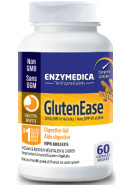Gluten Enzymes
What Are Gluten Digesting Enzymes?
Gluten is a structural protein naturally found in certain cereal grains, including wheat (wheatberries, durum, emmer, semolina, spelt, farina, farro, graham, kamut, and einkorn), rye, barley and triticale. Since these grains are widely used in prepared foods, like bread, pasta, cereal, baked goods, crackers, soup, etc., avoiding gluten can be challenging. Read more >-
 Natural Factors ReliefZyme Intensive Strength is a unique enzyme blend that supports the digestive process and the breakdown of foods containing gluten, wheat, and dairy proteins. When taken as a digestive aid with meals, ReliefZyme Intensive Strength helps to break down food and support nutrient absorption. With improved digestion hel...Natural Factors ReliefZyme Intensive Strength is a unique enzyme blend that supports the digestive process and the breakdown of foods containing gluten, wheat, and dairy proteins. When taken as a digestive aid with meals, ReliefZyme Intensive Strength helps to break down food and support nutrient absorption. With improved digestion helps reduce gas, bloating, and other complications that are associated with food sensitivities. [VCAPS]+ Earn 24 Reward Points
Natural Factors ReliefZyme Intensive Strength is a unique enzyme blend that supports the digestive process and the breakdown of foods containing gluten, wheat, and dairy proteins. When taken as a digestive aid with meals, ReliefZyme Intensive Strength helps to break down food and support nutrient absorption. With improved digestion hel...Natural Factors ReliefZyme Intensive Strength is a unique enzyme blend that supports the digestive process and the breakdown of foods containing gluten, wheat, and dairy proteins. When taken as a digestive aid with meals, ReliefZyme Intensive Strength helps to break down food and support nutrient absorption. With improved digestion helps reduce gas, bloating, and other complications that are associated with food sensitivities. [VCAPS]+ Earn 24 Reward PointsSale: $24.47
Reg.: $29.99 (Save $5.52)
In Stock -
 SUPPORT FOR THOSE SUFFERING FROM GLUTEN INTOLERANCE. Enzymedica's GlutenEase contains a unique combination of proteases for digesting gluten and casein. GlutenEase addresses issues that also stems from gluten intolerance; problems digesting the carbohydrates of offending foods. For this reason, GlutenEase also contains Amylase Thera-B...SUPPORT FOR THOSE SUFFERING FROM GLUTEN INTOLERANCE. Enzymedica's GlutenEase contains a unique combination of proteases for digesting gluten and casein. GlutenEase addresses issues that also stems from gluten intolerance; problems digesting the carbohydrates of offending foods. For this reason, GlutenEase also contains Amylase Thera-Blend and Glucoamylase which assist the digestion of the carbohydrate portion of grains (such as wheat) which often contain gluten. Enzymedica's great enzyme combination proactively supports the gut, allowing proteins to be properly broken down and absorbed in their digested state, broadening the potential food groups a person may eat. [CAPS]+ Earn 32 Reward Points
SUPPORT FOR THOSE SUFFERING FROM GLUTEN INTOLERANCE. Enzymedica's GlutenEase contains a unique combination of proteases for digesting gluten and casein. GlutenEase addresses issues that also stems from gluten intolerance; problems digesting the carbohydrates of offending foods. For this reason, GlutenEase also contains Amylase Thera-B...SUPPORT FOR THOSE SUFFERING FROM GLUTEN INTOLERANCE. Enzymedica's GlutenEase contains a unique combination of proteases for digesting gluten and casein. GlutenEase addresses issues that also stems from gluten intolerance; problems digesting the carbohydrates of offending foods. For this reason, GlutenEase also contains Amylase Thera-Blend and Glucoamylase which assist the digestion of the carbohydrate portion of grains (such as wheat) which often contain gluten. Enzymedica's great enzyme combination proactively supports the gut, allowing proteins to be properly broken down and absorbed in their digested state, broadening the potential food groups a person may eat. [CAPS]+ Earn 32 Reward PointsSale: $32.68
Reg.: $37.58 (Save $4.90)
In Stock
Gluten Digesting Enzymes
Gluten is a structural protein naturally found in certain cereal grains, including wheat (wheatberries, durum, emmer, semolina, spelt, farina, farro, graham, kamut, and einkorn), rye, barley and triticale. Since these grains are widely used in prepared foods, like bread, pasta, cereal, baked goods, crackers, soup, etc., avoiding gluten can be challenging. This is bad news for individuals who cannot tolerate or are sensitive to gluten, also known as non-celiac gluten sensitivity. But thankfully there are such things as gluten digesting enzymes!
According to the Canadian Digestive Health Foundation, an estimated 1 in 114 Canadians cannot tolerate gluten. The condition results from the body erroneously reacting to gluten as a toxin, causing one’s immune cells to overreact and attack it. After a while, this triggers inflammation in the digestive tract (that can quickly become systemic), causing side effects such as fatigue, brain fog, mood swings, migraines, bloating, alternating constipation and diarrhea, unintentional weight loss, malnutrition, and ultimately, intestinal damage. Moreover, studies have linked gluten intolerance with a higher risk of learning disabilities, including autism and ADHD, and neurodegeneration, including dementia and Alzheimer's.
In such instances, gluten-digesting enzymes can be a game-changer. Among these are:
- Proteases that break down proteins, including gluten.
- Amylases that break down carbohydrates, as well as gluten proteins.
- Peptidases that break down peptides, including gluten peptides.
These enzymes help break down gluten proteins into smaller peptides, which can help people with gluten sensitivity digest gluten more efficiently and prevent symptoms such as abdominal pain, bloating, and diarrhea.
Benefits of Gluten Digesting Enzymes
- Aids In The Digestion Of Sugar And Starch Molecules
- Assists Digestion
- Helps Relieve Intestinal Inflammation, Malabsorption, And Leaky Gut
- Promotes Healthy Carbohydrate Digestion
- Treats Gluten Intolerance/Sensitivity
Who Needs Gluten Digesting Enzymes?
The symptoms of gluten intolerance can vary widely from person to person and range from mild to severe. A knowledgeable natural health care practitioner may recommend a quality gluten-digesting enzyme to those with diagnosed gluten intolerance or anyone with obvious gastrointestinal symptoms triggered by consuming gluten-containing foods.
In addition, certain people do not produce sufficient digestive enzymes because of genetics, injury or illness (including celiac disease). A gluten digestive enzyme, or ideally a full-spectrum enzyme blend, can be helpful in such instances.
Gluten Digesting Enzymes – Forms, Formats, and Potency
Supplements to support the digestion of gluten are available wherever you buy your nutritional supplements. They typically come in pill forms, such as capsules and caplets, in various potencies. Your enzyme supplements should always be taken with a meal for optimal efficacy. Always follow dosing instructions carefully.
Final Thoughts
Enzyme supplements are not a substitute for a gluten-free diet in those with gluten intolerance and celiac disease. Taking an enzyme supplement without following a gluten-free diet is unlikely to prevent damage to the small intestine caused by chronic inflammation.
Speak to your healthcare provider for guidance on implementing a gluten-free diet.
Back to Top ↑





















